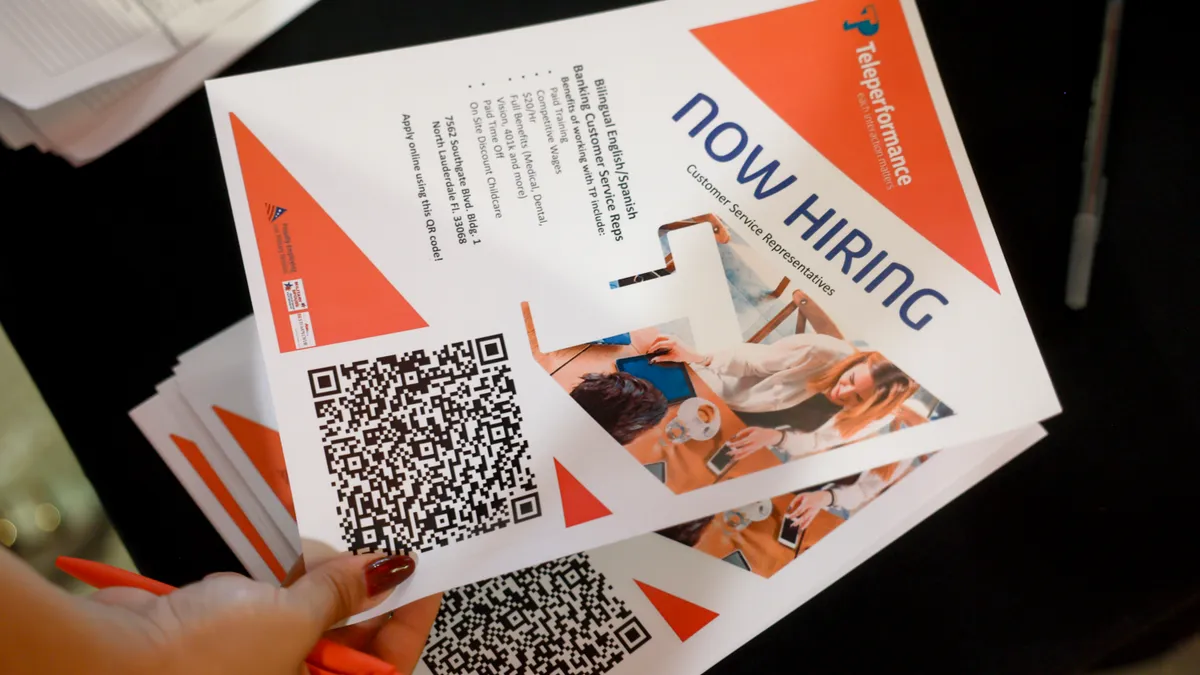Many managers and career coaches who continued mentoring in 2020 got schooled by the pandemic.
Experts told HR Dive that mental health is top of mind for mentees. This trend mirrors ongoing conversations about the United States, its workforce, and individualized approaches to labor in the U.S. (See: the passion, curiosity, and fuss around the hybrid work model.) Cat Ward, a corporate management professional at Jobs For the Future, an economic development firm, believes that mentoring can foster inclusion at this pivotal moment in history.
"People working remotely may feel a bit more estranged from the environment," Ward, managing director of JFFLabs and heads JFF's Corporate Action Platform and Advisory Services practice, said to HR Dive. "Mentoring can be a really important way to help people build professional social capital, help them develop a team of allies, and help give them a sense of career navigation and the norms for navigating through the internal dynamics and politics."
But beyond professional development, mentoring can also level the playing field for marginalized folks, Ward explained. Below is more insight Ward offered in her HR Dive interview regarding the role of mentoring in corporate D&I strategy. This interview has been edited for length and clarity.
HR Dive: Can you talk about what your role at Jobs for the Future entails?
Cat Ward: My specific focus has been to help establish JFF's presence as it relates to influencing employer behavior around talent management practices. I've helped to build our corporate leadership practice ... which includes an impact employer model which is how we help companies to center, equity and economic mobility in their talent practices and their broader business strategy.
Then, we have a Corporate Action Platform, which convenes over 350 Fortune 1000 companies around issues related to economic advancement in their business and in their communities. And finally, we have a Corporate Solutions practice that will work one-on-one with companies to build bespoke solutions — to really help companies tap into JFF's expertise on equity and economic advancement.
HR Dive: You mentioned equity. What would you recommend to HR professionals, to make sure everyone is getting the mentoring they need? And is that informed by diversity and inclusion best practices?
Ward: The definition of "equity" is really important. It's a term that is being used a lot right now. But "equity" is really distinct from "equality," in that it's about helping people get the support they need. Meet them where they are. Level the playing field. Everything that JFF does is through a lens of meeting individuals where they are in their experience as a learner, and as a job seeker and as an employee.
HR Dive: What kinds of challenges do you see corporate leaders or HR professionals having when it comes to mentoring people on the job? And have you seen their approach change, now that people aren't going into the office as much?
Ward: One of the first things to acknowledge here is that, in the last year, we saw a lot of the talent management systems, norms and structures that we knew get tested, tried and frankly dismantled. Or torn apart and need to get rebuilt. We saw some companies build talent management solutions in a matter of weeks that, in the past, would have taken them years to get the buy-in and support.
I think people recognized how valuable the talent management function was when everything that we knew about talent management basically flew out the window. Whether it was that companies were going through layoffs or furloughs, or lost a major part of their business. Or whether it was that, actually, in the wake of the pandemic, they saw a surge of business. And the company was doing very well, so they needed to hire [more employees].
We had a health crisis, a humanitarian crisis, an economic crisis and then adding on to all of that: The country went through a much-needed, long-awaited reckoning with racial inequity and systemic racism in our societal structure, and our business structures and norms. I think our society is open to and eager for a new conversation about equity, a new conversation about equality and a much more explicit conversation on race, privilege, and systemic change.
Companies looking into this made major investments in hiring more racially diverse talent, and how they could retain and advance that talent. Companies set a lot of ambitious targets around racial diversity and many companies have been able to [meet those targets] — because, frankly, talent really is everywhere. It's just, as the saying goes, opportunity is not. Once that talent comes on board, we're hearing, a lot of companies are having a hard time retaining that talent.
Companies do need to think about their culture. How do you support that talent? Do you have a culture of inclusion and belonging? And importantly for this conversation: Can people see themselves within the organization? Do they have a support network? Can they build political, professional or social capital from a distance?
Because the reality is that Black talent, Latinx talent, Native American talent is oftentimes underrepresented in the workforce. They have social capital, but what we're talking about here is professional social capital that can translate into career navigation support. Support on how to make one's way through the workforce, and frankly, support for feeling included. Like you've got somebody who's got your back at your organization.
When you get to know someone as an individual, they are no longer a statistic. They're a person with multiple dimensions.

Cat Ward
Managing director, JFFLabs
Many companies are finding that virtual mentoring can be a way to engage their talent. It's important particularly for young talent — many of whom are early in their career — and are now lacking the natural, organic pass-you-in-the-hall moments. So we need to be intentional about demonstrating the way that the workplace is working. I think [there should be specific focus] on talent who may be more susceptible to feeling a sense of exclusion or a feeling that this [company] might not be the place for them.
I think virtual platforms are really promising right now to create these points of connection. And again, if you're looking at diversity as a goal, a hybrid work environment where you can hire your talent from anywhere (and they don’t need to be in the hub where your headquarters are) creates huge opportunities for diverse talent pools to form.
HR Dive: What are some ways that you're seeing companies make sure employees feel like they're included and that they belong — like they want to keep working at a company?
Ward: One cool resource is Imperative. They do peer-to-peer mentoring, which is facilitated with this online platform. Brené Brown did a really interesting session [with executive coach Patrice Gordon] on her podcast about reverse mentoring. Senior leaders speak to more junior team members. This is a really amazing way to promote employee voice in decision-making, and to create a more inclusive environment that is reflective of what people actually experience. But this is where more senior and experienced leaders would get mentored by more junior team members, and that helps to inform their work.
HR Dive: I feel like breaking down that hierarchy can help people feel obviously more included.
Ward: There's a lot of talk around worker voice and employee voice, and how you give workers greater agency. And a bigger seat at the table when it comes to decision-making, because so frequently, decisions are made about people when they're not in the room. They don't have any agency. And this becomes particularly important when we talk about frontline workers or workers who have been, in the past, marginalized.
But I think that it could apply to all kinds of workers, and across all kinds of levels and backgrounds. [Reverse mentoring] is a great way to help people get past bias, whether it's a generational bias, racial bias, gender bias. When you get to know someone as an individual, they are no longer a statistic. They're a person with multiple dimensions. And that is one of the most powerful ways, frankly, to change minds and change behaviors.























